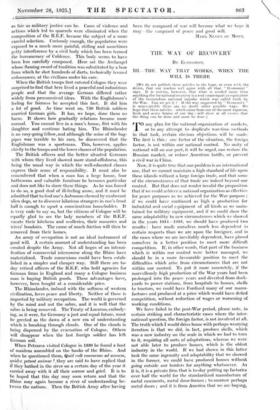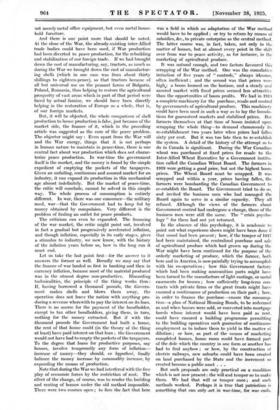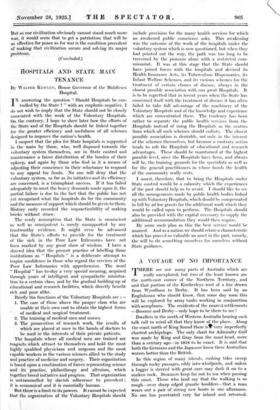THE WAY OF. RECOVERY •
By ECONOMIST.
M.—THE WAY THAT WORKS, WHEN THE WILL IS THERE
[We do not publish these articles in the hope, or even with the desire, that our readers will agree with all that " Economist " says. It is certain, however, that what is needed more than anything else for national recovery is a real counterpart or equivalent. of the tremendous national impulse which was called forth br the War. Can we get it ? If the way suggested by " Economist is unacceptable there are no doubt other possible ways. We hope that those articles — which come from one of the most vigorous. fresh and acute brains of our day--‘-will show at all events that the thing can be done and must be done.]
TO any plan for the national organization of markets, or to any attempt to duplicate war-time methods in that task, certain obvious objections will be made. The first is this : one factor of the situation, the foreign factor, is not within our national control. No unity of national will on our part, it will be urged, can restore the Russian market, or reduce American tariffs, or prevent a civil war in China.
Now, it is quite true that our problem is an international one, that we cannot maintain a high standard of life upon these islands without a large foreign trade, and that some of the circumstances of that trade arc indeed beyond our Control. But that does not render invalid the proposition that if we could achieve a national organization as effective for peace purposes as we achieved for the War .purpose ; if we could have continued as high a production for industrial and social equipment of all kinds as we main- tained for military equipment, and if we could show the same adaptability to new circumstances which we showed in the years 1914-1918, we should have produced two results have made ourselves much less dependent in certain respects than we are upon the foreigner, and in the cases where we are inevitably dependent, have placed ourselves in a better position to meet more difficult competition. If, in other words, that part of the business which is within our control were better managed, we should be in a more favourable position to meet the difficulties which arise from circumstances that are not within our control. To put it more concretely, if the marvellously .high production of the War years had been prolonged into the peace years and diverted from dock- yards to power stations, from hospitals to houses, shells to tractors, we could have Fordizcd many of our manu- factures and produced at a price which would have defied competition, without reduction of wages or worsening of working conditions.
We have failed in the post-War period, please note, in certain striking and characteristic cases where the inter- national question, the foreign factor, is not involved at all. The truth which I would drive home with perhaps wearying iteration is that we did, in fact, produce shells, which was a new- industry on the scale in which we had to turn to it; requiring all sorts of adaptations, whereas we were -not 'able later . to produce houses, which is the oldest industry in the world. If we had shown in this latter task the same ingenuity and adaptability that we showed in the former, we could have produced houses without going outside our borders for anything whatsoever. As it is, it is a private firm that is to-day putting up factories over half the world for the standardized manufacture of metal casements, metal door-frames ; to-,morrow perhaps metal doors ; and it is from America that we are buying, not merely metal office equipment, but even metal house- hold furniture.
And there is one point more that should be noted. At the close- of the War, the already-existing inter-Allied trade bodies could have been used, if War production had been diverted to peace production, for the rebuilding and stabilization of our foreign trade. If we had brought down the cost of manufacturing, say,- tractors, as much as -during the War we brought down-the cost of manufactur- ing shells (which in one case was from about thirty shillings to eighteen-pence), so that tractors became of all but universal use on the peasant farms of Bulgaria, Poland, Rumania, thus helping to restore the agricultural prosperity of vast areas which in part of that period were faced by actual famine, we should have been directly helping in the restoration of Europe as a whole, that is, of our foreign markets.
But, it will be objected, the whole comparison of shell production to house production is false, just because of the market side, the finance of it, which in the preceding article was suggested as the core of the peace problem. The objector might say : Even apart from the War will and the War energy, things that it is not perhaps in human nature to maintain in peace-time, there is one central fact about war production which does not charac- terize peace production. In war-time the government itself is the market, and the money is found by the simple expedient of emptying the pockets of the taxpayers. Given an unfailing, continuous _and assured market for an industry, it can expand its production in this mechanical age almost indefinitely. But the market of peace-time, the critic will conclude, cannot be solved in this simple way. The whole process of consumption is entirely different. In war, there was one consumer—the military need, war—that the Government had to keep fed by money obtained by compulsion. Very different is the problem of finding an outlet for peace products.
The criticism can even be expanded. The financing of the war market, the critic might point out, involved in fact a gradual but progressively accelerated inflation, and though inflation, especially in its early stages, gives a stimulus to industry, we now know, with the history of the inflation years before us, how in the long run it must end.
Let us take the last point first—for the answer to it • answers the former as well. Broadly we may say that the finance of war landed us first in banking and then in currency inflation, because most of the material produced -was in the utmost degree non-productive. Discarding technicalities, the principle of the thing works thus : If, having borrowed a thousand pounds, the Govern- ment makes shells and blows them • away, the operation does not leave the nation- with anything pro- ducing a revenue wherewith to pay the interest on its loan. There is no source for the payment of the bondholder, -except to tax other bondholders, giving them, in turn, -nothing - for the money -extracted. But if with the -thousand pounds the Government had. built a house, the rent of that house -could (in the theory of the thing id least) have paid interest on that loan ; • the Government -would not-have had to empty the pockets of the taxpayers. To the degree that loans for productive purposes, -say -houses, involve- temporarily any form of inflation-- increase of money—they should, ea hypothesi, finally balance the money increase by commodity increase, by expanding the- means of production.
Note that during-the War-we had interfered with the free play of economic forces by -the restriction of rent. The effect of the change, of course, was to render the-building and renting of houses under. the old method _ impossible. There-were two-courses open ; _ to face the fact that here was .a which an adaptation of 'the War method would have to be applied ; or try to return by means of subsidies, &c., to private enterprise as the central method. The latter course was, in fact, taken, not only in the matter of houses, but at almost every point in the shift over from war to peace activity, as for instance, in the marketing of agricultural produce.
• It was natural enough, and two factors favoured this scrapping of the War method. One was the cumulative irritation. of five years of " controls," always irksome, often inefficient ; and the second was that prices were high.; a boom loomed on the horizon, and a steady and assured market with -fixed 'prices seemed less attractive than the opportunities of boom profits. We had in 1919 a complete machinery for the purchase, resale and control by governments of agricultural produce. This machinery could have been used in such a way as to lay the founda- tions for guaranteed markets and stabilized prices. But farmers themselves at that time of boom insisted upon scrapping the whole thing—to demand clamorously its re-establishment two years later when prices had fallen sixty per cent. But it was too late then to re-establish the system. A detail of the history of the attempt so to do in Canada is significant. During the War Canadian -wheat was purchased at fixed prices for- resale to the Inter-Allied Wheat Executive by a Government institu- tion called the Canadian Wheat Board. The farmers in 1919 were getting a good price, but not the- highest boom prices. - The Wheat Board must be scrapped. It was scrapped and within a -year, prices having fallen, the farmers were bombarding the Canadian Government to -re-establish the Board. The Government tried to do so, and invited the business men who had managed the Board again to serve in a similar capacity. They all refused. Although the views of the farmers about Government control had undergone a change, those of the: business men were still the same. The " -crisis psycho-' -logy " for them had not yet returned. i In the absence of this psychology, it is academic to' point out what experience -shows might have been done if that mood had been present; how, if the temper of 1917' had been maintained, the centralized purchase and sale of agricultural produce which had grown up during the War might have been continued for the -purpose of the orderly marketing of produce, which the farmer, both here and in America, is now painfully trying to accomplish -with his co-operatives ; how this Government factory, which had - been making ammunition parts might have been turned to the manufacture of light castings, or metal easements for houses ; - how sufficiently long-term con- tracts with private firms or the great trusts might have ensured a continuance of production on their part ; how, in order- to finance the purchase—ensure the consump- tion—a plan of National Housing Bonds, to be redeemed as and when houses were sold, or converted into mortgage bonds whose interest would -have been paid as rent, could have ensured a building programme- permitting to the building operatives such guarantee of continuous employment as to induce them to yield in the matter of dilution ; or how, as part of - the means of marketing completed houses, _house -room could have. formed part of the dole which the country in one form or another has had to find anyhow ; or how,- by the construction of electric railways, new suburbs • could have been created on land purchased by the State and the increment •so -created become a public asset . . .
But such proposals are only -practical on a condition which is not now present :- the will and temper so to make them. We had that will or temper once ;- and such methods worked. Perhaps it is true that patriotism .is something- that can only-act - in war-time, -for -war-ends. Hut as our civilization obviously cannot stand much more war, it would seem that to get a patriotism that will be as effective for peace as for war is the condition precedent of making that civiliiation secure and solving its major problems, (Concluded:)
























































 Previous page
Previous page